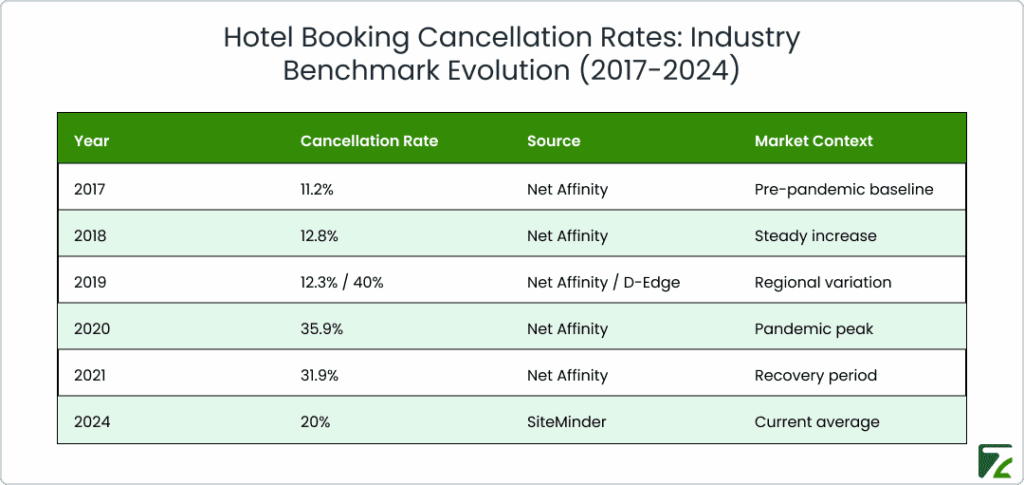What Industry Benchmarks Reveal About Hotel Reconfirmation Success
- The Scale of the Problem: Industry Cancellation Benchmarks Tell a Shocking Story
- Why Hotel Reconfirmation Has Never Been More Critical
- Guest Behavior Changes Amplify Reconfirmation Importance
- Technology Infrastructure Enables Systematic Reconfirmation
- The Reconfirmation Opportunity Convergence
- What Industry Benchmarks Reveal: Reconfirmation Imperatives
- Conclusion
When travel companies seek to benchmark the hotel industry, there is a strong commonality: current data from the leading hospitality market research groups imply a goldmine in plain sight. This opportunity centers around the proactive service process whereby travel agencies contact hotel properties directly to check on existing reservations following the initial booking confirmation, usually 48-72 hours in advance of guest check-in.
Although the hotel industry has sophisticated measurements for booking conversions and guest satisfaction, hardly anyone measures this crucial data between “booking confirmed” and “guest checks in successfully.” In-depth research undertaken on data provided by D-Edge Hospitality Solutions, J.D. Power, SiteMinder and other front-runners in the industry shows this unquantified hole is one of the biggest competitive advantages a travel agency can utilize in its business.
The Scale of the Problem: Industry Cancellation Benchmarks Tell a Shocking Story
The most revealing industry benchmark comes from booking failure rates, which paint a stark picture of the challenges facing travel agencies today:

The data tells a surprising story: D-Edge Hospitality Solutions found that the international cancellation rate for hotel reservations was 40% in 2019, which means nearly half of all bookings never stayed in a room.
Although the latest SiteMinder data indicates an increase to a 20% average cancellation rate, that is still a monumental task to take on. The detailed trail followed by Net Affinity illustrates the volatility of booking integrity, that have fluctuated between a pre-covid high of 11-13% and a peak of 35% during the crisis.
These numbers tell a fundamental truth: even in the best-performing years, more than 1 out of 10 confirmed bookings did not convert to actual stays. During tough times, that failure rate is close to one in three bookings. For travel agencies, that doesn’t just mean lost sales commissions but also spoiled business relationships and operational chaos.
Crucially, industry statistics demonstrate that bookings made directly through websites have the lowest incidence of cancellation, which implies that the more closely hotels and booking parties communicate (that is: exactly what systematic reconfirmation provides), the more stable the bookings themselves are.
Why Hotel Reconfirmation Has Never Been More Critical
The cost of booking failures has increased significantly, which means systematic reconfirmation is much more valuable for travel agencies.
According to the firm’s 2024 study the average daily rate (ADR) for U.S. hotel rooms in May 2024 was $158.45 the second highest month of all time. The fact that ADR is forecasted to increase by 4.9% over the next 12 months means each successful reconfirmation today is worth much more revenue than that of only 24 months ago!
Luxury hotels at a cost of $320.82 per night make reconfirmation even more attractive. Just a single avoided cancel in this luxury segment can cover considerable investment in systematic reconfirmation processes.
67% U.S. hotel occupancy in October 2024 make reconfirmation a must rather than an option. At these levels of occupancy, a hotel just can’t go out and replace any cancelled bookings, so reconfirmation is key for spotting booking discrepancies, overbooking and reservation errors before guests turn up to discover the problem is irresolvable.
High performance markets show the greatest reconfirmation value: the UK’s 80.8% occupancy and Ireland’s 91% Q3 rates are situations in which booking errors or overbookings found at check-in are not fixable due to lack of an alternative.
Guest Behavior Changes Amplify Reconfirmation Importance
Nowadays traveler behavior further justifies systematic reconfirmation, since guests have gotten more worthwhile and demanding.
Higher Individual Booking Value
According to data from J.D. Power, on visits to North America, guests are taking nine trips a year (it was 10 in 2023) and staying 3.43 days (3.36 days). This newer model of less, longer trips makes each client brought back to the table about reconfirm that much more valuable personally and by a wide margin socially for the agency.
Zero Tolerance for Booking Failures
J.D. Power’s study shows value perception continues to decrease as guests’ demanded expectations are on the rise for the price they paid for their room or night’s stay. This provides an important frame for reconfirmation: failures to book that people might otherwise have forgiven at $120/night become relationship-altering catastrophes at $158+.
Systematic revalidation becomes necessary to stop these high-cost service disruptions before they affect customer relationships.
Technology Infrastructure Enables Systematic Reconfirmation

Also, digitized booking infrastructure: If one has digitized one’s booking infrastructure, that actually means there are not too many blockers in the way of a decent reconfirmation process.
D-Edge also says that 60% of global distribution revenue comes from digital channels and that 60% of hotel bookings are made online, according to SiteMinder. This allows agencies to lay a digital foundation to build up automatic reconfirmations that are verified in a structured manner as opposed to a selective manner.
Optimal Timing Windows Support Reconfirmation
In industry, we are working with an average booking lead time of 29.7 days but of cancellation lead time of 27.4-30.8 days. These trends are ideal for forms of reconfirmation within 48 – 72 hours of arrival, which balances the opportunity for problem resolution and most likely cancellations.
The Reconfirmation Opportunity Convergence
Industry standards indicate that many trends are currently driving both the requirements for and the feasibility of a systematic realization of reconfirmation in research.
The Economic Case
With cancellation rates as high as 20-40%, $158+ in average daily rate dollars, and 67%+ in occupied rooms limiting replacement options, each prevented booking failure through reconfirmation holds significant worth. Luxury tier rates, such as $320+ adds to the ROI story.
The Competitive Advantage
The industry’s failure to establish reconfirmation benchmarks creates an unusual opportunity: agencies implementing systematic reconfirmation operate in an unmeasured performance area. This allows early adopters to establish competitive advantages through superior booking reliability before the market develops standardized expectations.
What Industry Benchmarks Reveal: Reconfirmation Imperatives
The coincidence of some industry related information suggests certain reconfirmation strategies:
Focus on High Average Rate Reconfirmation: Reconfirmation efforts should be intense for luxury bookings, at an average rate of $320 per night, that you want to help ensure you stay on the books.
Emphasize High-Occupancy Market Reconfirmation: Markets above 70% occupancy operate with no room for booking failure and should regularly reconfirm.
Leverage Digital Infrastructure for Reconfirmation Scale: 6 With 60% digital distribution penetration, automatic reconfirmation systems are obvious.
Tailor Reconfirmation According to Guest Performance: As trips become less frequent, longer, and more valuable, higher reconfirmation reliability is warranted.
Conclusion
Examination of hotel industry benchmarks shows that structured reconfirmation works on identified pain points and brings business benefits out of these. Cancellation rates 20%-40% Price erosion with average daily rates greater than $158 67% occupancy and limiting replacement options. Higher pricing guest expectations (for higher pricing). With the convergence of industry trends, the case for reconfirmation of investment is very urgent and compelling.
The benchmark evidence goes beyond best practice; it signals competitive sacristy. While the price of a guest room goes up, and the tolerance for hotel fails by guest diminishes, booking integrity becomes an imperative to both revenue preservation and customer loyalty. The digital infrastructure is in place, the timing windows are right, and the financial incentives are there.
What is most important, however, is that the industry’s inability to implement reconfirmation indicators constitutes a rare competitive advantage. Agencies with advanced reconfirmation will have real opportunities in a performance area not currently measured, to cordon off a competitive advantage and establish a position of long-term market relevance as business changes further.
The issue isn’t whether reconfirmation delivers value by industry standards; it does so in spades. The question is how fast agencies adopt consistent patterns that can turn this into a competitive edge.
Hotel booking reconfirmation is the process where a travel agency proactively contacts a hotel typically 48–72 hours before check-in to verify a guest’s reservation details. This includes confirming the guest name, check-in/check-out dates, room type, payment status, and any special requests.
It’s important because booking systems can have gaps or delays in syncing, and guests may make changes or cancel without notifying the agency. Reconfirmation ensures there are no surprises at check-in, helping avoid service failures and reinforcing trust between the agency, the hotel, and the traveler.
Reconfirmation provides travel agencies with several strategic advantages:
- Reduced cancellations and no-shows: Identifies problems in advance and enables corrective action.
- Stronger client relationships: Clients value the assurance of a double-checked booking, especially for high-stakes or luxury trips.
- Fewer last-minute escalations: Helps avoid operational chaos and builds internal efficiency.
- Improved reputation: Demonstrates diligence and reliability in service delivery.
- Revenue preservation: Avoids lost commissions due to failed bookings or hotel overbookings.
Cancellation rates are rising due to more flexible booking policies, trip-stacking behavior (where guests book multiple hotels), and short-term planning trends. In some regions, OTA cancellations can be as high as 40%.
Reconfirmation helps by identifying which reservations are still valid, detecting duplicates, and allowing agencies to update hotel systems with the latest guest intent. It can’t prevent cancellations entirely, but it significantly reduces the damage from last-minute changes.
Today’s travelers book closer to the travel date, expect flexible cancellation, and often travel less frequently but stay longer and spend more. They’re also more tech-savvy and demand higher service standards for the price they pay.
This makes reconfirmation crucial: longer stays and higher prices mean the cost of booking failures is now much greater. Agencies need to validate every booking detail, especially for higher-value clients, to deliver the seamless experience guests now expect.
Absolutely. During peak seasons, hotels may overbook anticipating cancellations. If your booking isn’t reconfirmed, the hotel may reallocate the room causing a major service failure.
For luxury or VIP bookings, the stakes are even higher. Guests expect perfection, and even minor issues can lead to significant dissatisfaction. Reconfirming ensures premium services (like amenities or upgrades) are secured, protecting both the traveler experience and the agency’s reputation.
